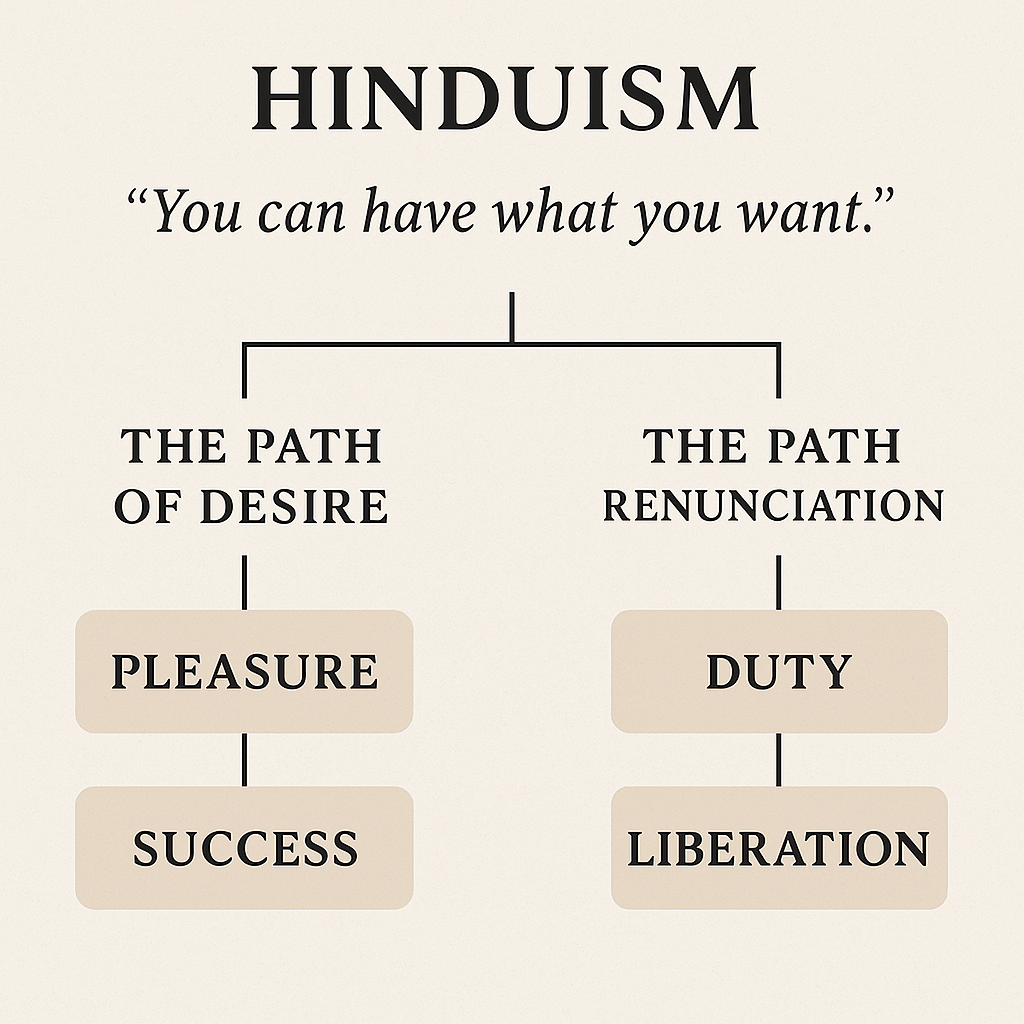Hinduism, one of the world’s oldest and most complex religions, is remarkably broad and inclusive. At its core, according to Huston Smith’s interpretation, it is built on a fundamental principle: You can have what you want. This idea is not a vague promise but a structured understanding of human aspirations and the paths people take in search of fulfillment. The question then arises—what do people truly want?
Hindu thought recognizes that human desires generally evolve through different stages, and it categorizes these aspirations into four primary goals of life, known as the Purusharthas: Kama (pleasure), Artha (success), Dharma (duty), and Moksha (liberation). The first two—pleasure and success—belong to what is called the Path of Desire, while the latter two belong to the Path of Renunciation, where one seeks fulfillment beyond the material world.
The Path of Desire: Pleasure and Success
The first and most immediate goal in life is pleasure (Kama). Hinduism does not deny or condemn the human desire for pleasure. On the contrary, it acknowledges that pleasure is a natural and legitimate pursuit. Whether in the form of sensory enjoyment, love, art, music, or companionship, pleasure is something that people seek instinctively.
Hinduism even provides guidance on how to experience pleasure wisely, emphasizing refinement and balance. However, over time, individuals may come to see that pleasure alone is not fully satisfying. It is fleeting, temporary, and often self-centered. No matter how much pleasure one experiences, it is never enough to provide lasting fulfillment. Eventually, many people find themselves yearning for something more.
This leads to the second great pursuit: worldly success (Artha). Success takes many forms—wealth, power, and social recognition. Unlike pleasure, which is primarily personal, success is more outward-facing. It grants influence, security, and a sense of achievement. Hinduism does not discourage this pursuit either. In fact, it acknowledges the importance of stability, prosperity, and responsibility in society.
However, as with pleasure, success has its limitations. First, it is competitive—one person’s gain often comes at another’s loss. Second, it is insatiable—there is always more to achieve, and the satisfaction of success is often short-lived. Lastly, it is temporary—wealth, power, and fame do not last beyond one’s lifetime. A person who has achieved great success may still feel a deeper longing, sensing that there must be something beyond material accomplishments.
At this point, an individual may begin to question: Is there something greater than pleasure and success? Hinduism teaches that when a person reaches this stage of understanding, they are ready to move beyond the Path of Desire.
The Path of Renunciation: Duty and Liberation
For those who seek something beyond personal pleasure and success, the next stage is Dharma (duty and righteousness). Dharma represents living in accordance with moral principles, responsibilities, and a sense of greater purpose. It involves serving others, upholding justice, and fulfilling one’s role in society. While it may require sacrifice, many people find deep satisfaction in dedicating themselves to a cause, a family, or a community.
Dharma is considered a higher pursuit than pleasure or success because it shifts the focus away from self-centered desires toward the well-being of others. A person following Dharma is no longer just thinking about what they can gain but about what they can give. However, even Dharma is not the ultimate goal. Though it provides a sense of meaning, it still belongs to the world of temporary experiences.
The highest and final goal, according to Hinduism, is Moksha (liberation). Moksha is the ultimate freedom—the release from the cycle of birth and rebirth (samsara). It is the realization of one’s true nature, which is beyond worldly attachments and limitations. In Hindu philosophy, this is the stage where one understands that they are not just an individual self (Atman) but part of a greater, infinite reality (Brahman). Achieving Moksha means reaching a state of deep inner peace, wisdom, and spiritual enlightenment.
A Gradual Awakening
Hinduism teaches that people do not need to rush toward renunciation or force themselves to give up pleasure and success prematurely. Each stage of life has its purpose, and desires should not be suppressed but understood and experienced fully. The natural progression from seeking pleasure, to achieving success, to embracing duty, and finally to seeking liberation is part of life’s journey.
Not everyone reaches the final stage in a single lifetime, and that is okay. Hinduism recognizes that people move at different paces and that all desires are valid as long as they are pursued with awareness and responsibility. The key is to recognize when a desire has been fulfilled and when it is time to move toward something greater.
Ultimately, Hinduism does not impose a single path but offers a framework for understanding human aspirations. It gently guides individuals toward self-discovery, allowing them to seek what they want—until they are ready to seek what they truly need.

